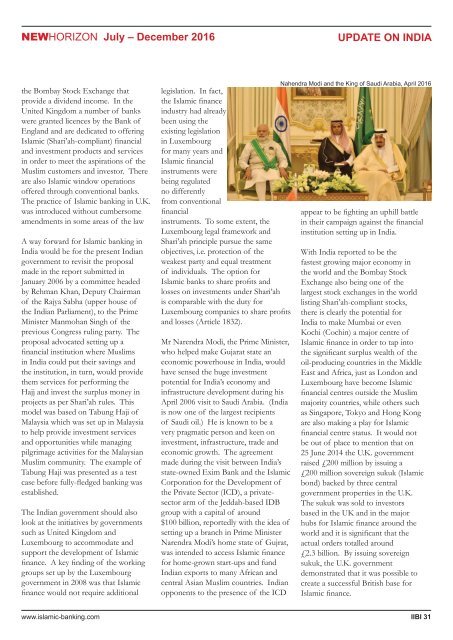NH-2016-q2
Create successful ePaper yourself
Turn your PDF publications into a flip-book with our unique Google optimized e-Paper software.
NEWHORIZON July – December <strong>2016</strong><br />
UPDATE ON INDIA<br />
the Bombay Stock Exchange that<br />
provide a dividend income. In the<br />
United Kingdom a number of banks<br />
were granted licences by the Bank of<br />
England and are dedicated to offering<br />
Islamic (Shari’ah-compliant) financial<br />
and investment products and services<br />
in order to meet the aspirations of the<br />
Muslim customers and investor. There<br />
are also Islamic window operations<br />
offered through conventional banks.<br />
The practice of Islamic banking in U.K.<br />
was introduced without cumbersome<br />
amendments in some areas of the law<br />
A way forward for Islamic banking in<br />
India would be for the present Indian<br />
government to revisit the proposal<br />
made in the report submitted in<br />
January 2006 by a committee headed<br />
by Rehman Khan, Deputy Chairman<br />
of the Rajya Sabha (upper house of<br />
the Indian Parliament), to the Prime<br />
Minister Manmohan Singh of the<br />
previous Congress ruling party. The<br />
proposal advocated setting up a<br />
financial institution where Muslims<br />
in India could put their savings and<br />
the institution, in turn, would provide<br />
them services for performing the<br />
Hajj and invest the surplus money in<br />
projects as per Shari’ah rules. This<br />
model was based on Tabung Haji of<br />
Malaysia which was set up in Malaysia<br />
to help provide investment services<br />
and opportunities while managing<br />
pilgrimage activities for the Malaysian<br />
Muslim community. The example of<br />
Tabung Haji was presented as a test<br />
case before fully-fledged banking was<br />
established.<br />
The Indian government should also<br />
look at the initiatives by governments<br />
such as United Kingdom and<br />
Luxembourg to accommodate and<br />
support the development of Islamic<br />
finance. A key finding of the working<br />
groups set up by the Luxembourg<br />
government in 2008 was that Islamic<br />
finance would not require additional<br />
legislation. In fact,<br />
the Islamic finance<br />
industry had already<br />
been using the<br />
existing legislation<br />
in Luxembourg<br />
for many years and<br />
Islamic financial<br />
instruments were<br />
being regulated<br />
no differently<br />
from conventional<br />
financial<br />
instruments. To some extent, the<br />
Luxembourg legal framework and<br />
Shari’ah principle pursue the same<br />
objectives, i.e. protection of the<br />
weakest party and equal treatment<br />
of individuals. The option for<br />
Islamic banks to share profits and<br />
losses on investments under Shari’ah<br />
is comparable with the duty for<br />
Luxembourg companies to share profits<br />
and losses (Article 1832).<br />
Mr Narendra Modi, the Prime Minister,<br />
who helped make Gujarat state an<br />
economic powerhouse in India, would<br />
have sensed the huge investment<br />
potential for India’s economy and<br />
infrastructure development during his<br />
April 2006 visit to Saudi Arabia. (India<br />
is now one of the largest recipients<br />
of Saudi oil.) He is known to be a<br />
very pragmatic person and keen on<br />
investment, infrastructure, trade and<br />
economic growth. The agreement<br />
made during the visit between India’s<br />
state-owned Exim Bank and the Islamic<br />
Corporation for the Development of<br />
the Private Sector (ICD), a privatesector<br />
arm of the Jeddah-based IDB<br />
group with a capital of around<br />
$100 billion, reportedly with the idea of<br />
setting up a branch in Prime Minister<br />
Narendra Modi’s home state of Gujrat,<br />
was intended to access Islamic finance<br />
for home-grown start-ups and fund<br />
Indian exports to many African and<br />
central Asian Muslim countries. Indian<br />
opponents to the presence of the ICD<br />
Nahendra Modi and the King of Saudi Arabia, April <strong>2016</strong><br />
appear to be fighting an uphill battle<br />
in their campaign against the financial<br />
institution setting up in India.<br />
With India reported to be the<br />
fastest growing major economy in<br />
the world and the Bombay Stock<br />
Exchange also being one of the<br />
largest stock exchanges in the world<br />
listing Shari’ah-compliant stocks,<br />
there is clearly the potential for<br />
India to make Mumbai or even<br />
Kochi (Cochin) a major centre of<br />
Islamic finance in order to tap into<br />
the significant surplus wealth of the<br />
oil-producing countries in the Middle<br />
East and Africa, just as London and<br />
Luxembourg have become Islamic<br />
financial centres outside the Muslim<br />
majority countries, while others such<br />
as Singapore, Tokyo and Hong Kong<br />
are also making a play for Islamic<br />
financial centre status. It would not<br />
be out of place to mention that on<br />
25 June 2014 the U.K. government<br />
raised £200 million by issuing a<br />
£200 million sovereign sukuk (Islamic<br />
bond) backed by three central<br />
government properties in the U.K.<br />
The sukuk was sold to investors<br />
based in the UK and in the major<br />
hubs for Islamic finance around the<br />
world and it is significant that the<br />
actual orders totalled around<br />
£2.3 billion. By issuing sovereign<br />
sukuk, the U.K. government<br />
demonstrated that it was possible to<br />
create a successful British base for<br />
Islamic finance.<br />
www.islamic-banking.com IIBI 31


